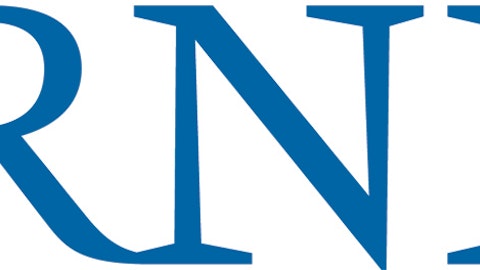Yahoo! Inc. (NASDAQ:YHOO)’s fortunes have gone downhill in recent years. The company is no longer viewed as a technology powerhouse that it once was. Newer and more innovative companies in the Internet landscape have attracted advertisers away from Yahoo. Not surprisingly, the company’s annual revenues have gone down from $7.21 Billion in 2008 to $4.98 Billion at the end of 2012. However, large share buybacks and improved operations will likely be a bigger driver for the company’s share price down the road.
Striking Up More Partnerships

In addition, Yahoo recently struck up a partnership with Google Inc (NASDAQ:GOOG) to ramp up the display advertising business with contextual ads. Google advertising technologies are top notch, and will place ads on various Yahoo and affiliate properties using Google’s AdSense. On mobile, using Google’s AdMob services, the company can expect to better monetize its mobile audience of more than 200+ million monthly unique visitors.
Platform Improvements
Yahoo is also making changes to its User Interface for a cleaner look, which should assist in placing more display ads across various Yahoo offerings like Shopping, Travel, Autos and Real Estate etc. The company is reinvigorating the Yahoo experience on mobile and a face-lift of Yahoo Mail and its photo-sharing app, Flickr has taken place in Dec-2012. Yahoo introduced a newer redesigned version of the Flickr app which allows for sharing on Facebook and Twitter. In addition, a number of key changes to the executive team have taken place in 2012 as well.
Display Business Should Gain Traction
Display revenues have long been a major source of revenue for Yahoo. Revenues from display advertising were down 3% Year-over-year and came in at $591m for Q4, and for the full year Display revenue stood at $2.143 Billion, which represented 43% of Yahoo’s total revenues of $4.99 Billion.
More importantly for Yahoo, in Q4 the number of ads portrayed on Yahoo Properties is down a material 10% year-over-year from Q4 2011, but compared to Q3 2012 saw a sequential increase of 3%. However, the reduction in the number of ads sold was partially offset by an increase in the price-per-ad of 7% from a year ago.
Due to increased partnerships with various companies including Google, the display business should see reasonable growth down the road. Increased personalized content and enhanced products are vital for growing Yahoo’s display revenues. However, like many other companies, revenues are have been somewhat affected by the user migration to mobile. Yahoo’s mobile adoption strategy has been pretty strong and has more than 200 million users in place.
Also, Yahoo acquired online-advertising technology company, Interclick for $270m in Nov-2011 to help revamp its online display advertising efforts. Yahoo has gained a better grip on its display advertising fortunes with Interclick and can expect a turnaround going forward due improved targeting capabilities.
Is The Search Alliance Working?
There is still growth in search for Yahoo, and even more so with the Microsoft partnership in place. Yahoo has a revenue sharing agreement with Microsoft in which Microsoft powers the search on Yahoo’s properties and Yahoo keeps 88% of revenues generated. And the company will be focused on growing their share on both desktop and mobile and can be expected to grow at a faster pace down the road, even though competition from Google and other regional search engine providers are very strong.
Yahoo’s search revenues have been rather steady in the last few quarters, because Microsoft guarantees a large portion of search revenues under a previous agreement. However, this agreement in North American locations will end in March 2013, and might impact search revenues going forward.
Yahoo’s Core Business Not Performing
Yahoo’s major headaches comes from the continued deceleration of its core business comprised of both display and search ads. Yahoo’s revenues were up 2% year-over-year and ended the Q4 2012 at $1.35B and for the full year stood at $4.99B which is flat from the revenues of 2011. Operating Income for Q4 2012 came in at $190m which is down 22% compared to Q4 2011 when it stood at $242m.
The bottom line for Q4 wasn’t too pleasing either; Net income was down 8% year-over-year to end Q4 2012 at $272m, compared to $296m a year ago in Q4 of 2011. EPS stood at $0.23 for Q4 2012 which is slightly down from the Q4 2011 EPS of $0.24, in spite of substantial share buybacks amounting to $1.45 billion in the 4th quarter.
Equity Interests and Share Repurchases Are Driving the Company Forward
Earnings from equity interests were up 18% year-over-year in Q4 primarily driven by the performance of Yahoo Japan and Alibaba. In 2012, the huge uptick in the net income was due to a net gain from the partial sale of Yahoo’s Alibaba stake. As a result, the EPS in 2012 saw massive improvement and came in at $3.28 compared to the 2011 EPS of $0.82. Earnings from Alibaba and Yahoo Japan have both been major contributors to Yahoo’s bottom line profits in recent years.
Going Forward
Yahoo’s core businesses have been in decline for years. However, the company has an attractive portfolio of assets. The near term drivers of the stock has been the $3.65B share repurchase, which drove the company’s earnings and the share price substantially higher. The company is in a transition phase, and is investing heavily to revamp its business segments, and might be a good turnaround story down the road.
The article Will This Company’s Fortunes Turn Around? originally appeared on Fool.com and is written by Ishfaque Faruk.
Copyright © 1995 – 2013 The Motley Fool, LLC. All rights reserved. The Motley Fool has a disclosure policy.





